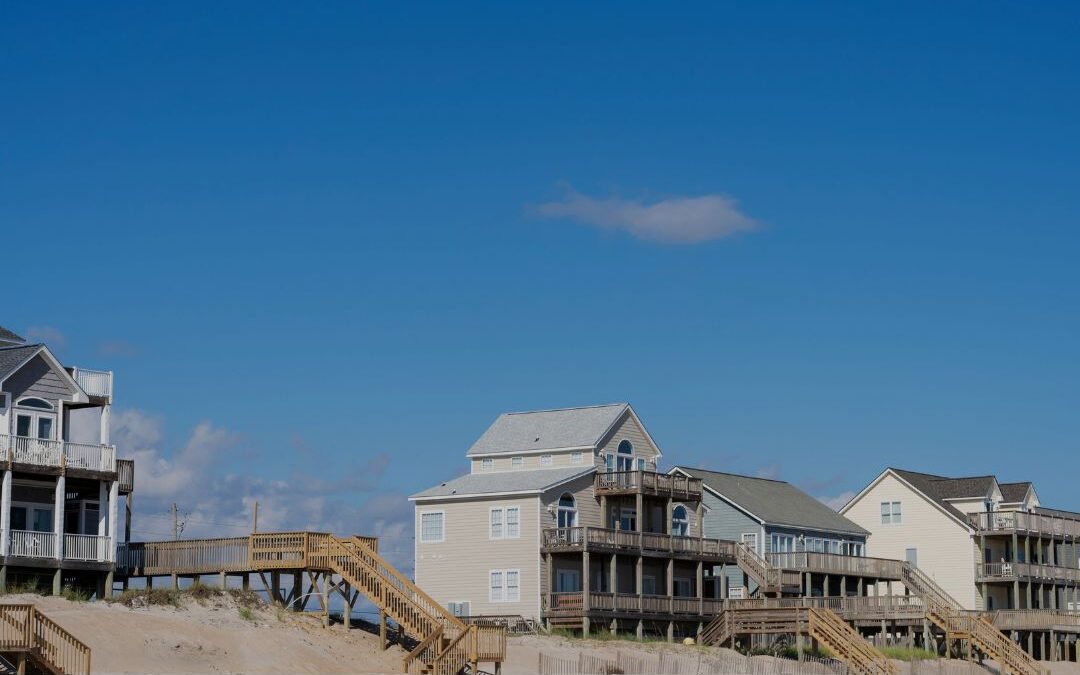Many regions throughout the Lowcountry including Folly Beach, Isle of Palms, Kiawah Island, Seabrook Island, Sullivan’s Island, and the surrounding areas, often face issues with saltwater air, which can have detrimental effects on HVAC systems. Saltwater air corrosion is caused by the salt particles suspended in the air that interact with the metal surfaces of air conditioning units, leading to gradual erosion. This process can compromise the performance of the air conditioner and eventually result in system failure, necessitating expensive replacements.
Below is a guide that discusses the impact of saltwater on HVAC Charleston SC and ways to prevent damage.
What Does the Salty Air Do to Your HVAC Equipment?
Living in Charleston, SC has its perks—enjoying the warm weather and the ocean breeze. However, the same ocean breezes that make the area so pleasant can also be harmful to your heating and cooling equipment.
The humid and salty air can wreak havoc on your air conditioning system, causing metals to corrode at an alarming rate. This salty air can make your AC deteriorate ten times faster than in normal conditions.
Effects of Saltwater on Your HVAC System in Charleston, SC
Saltwater can have a significant impact on HVAC systems in Charleston, SC. Here are some ways it can affect your AC unit:
Damage to the AC Condenser Coil
Your HVAC condenser coil is very susceptible to saltwater deposits. The coil contains copper tubes and aluminum fins.
Aluminum fins in your air conditioner are especially vulnerable to this corrosion. They can turn into dust over time when exposed to saltwater air. This makes it impossible for your system to cool your home.
But don’t think copper is immune to the corrosive nature of Charleston’s salt atmosphere. The copper tubes in your unit can also deteriorate over time, causing leaks in your system.
Clogged Filters
When saltwater is present in the air, it can be carried by the wind and eventually settle onto the filters in your ac unit. As the saltwater dries, it leaves behind salt crystals. These crystals often attract and hold onto dirt, dust, and other debris.
Over time, this buildup can become so significant that it clogs the filters. When the filters clog, it restricts the amount of air that can pass through the ac unit. This makes your system work harder to maintain the desired temperature in your building.
Faulty System
If saltwater gets on the electronic circuitry of your HVAC, it can severely corrode its protection surfaces. Over time, the electrical connections will also corrode, making your system faulty.
Reduced Efficiency
Damage caused by saltwater can reduce the efficiency of your HVAC Charleston, SC. As a result, it cannot achieve the same level of cooling or heating. The increased workload can cause your unit to consume more energy than necessary, leading to higher energy bills.
Shorter Lifespan
The corrosive effects of saltwater can cause your HVAC systems to fail prematurely. This means you will have to replace it sooner than expected.
Ways to Prevent Saltwater Damage in Your HVAC Charleston, SC
HVAC systems are a huge investment, and you don’t want your AC units to fail too early. Taking proactive steps to safeguard your South Carolina air conditioner from salt air corrosion is essential for its longevity and efficiency. Implement the following strategies to minimize the damaging effects of saltwater air on your heating and cooling system:
Routine Maintenance Service
Preventative maintenance is key to keeping your air conditioner functioning optimally. This includes cleaning or replacing air filters, testing, inspecting, calibrating, and cleaning coils, and ensuring proper refrigerant levels. HVAC maintenance services enables early detection of potential issues, preventing more severe problems from arising.
Fresh Water Rinsing
Periodically rinsing your outdoor unit with fresh water helps remove salt buildup and avert corrosion. Be sure to turn off your air conditioner before performing this task to avoid electrical complications.
Corrosion-Resistant Coatings
Enhancing your air conditioning unit with a corrosion-resistant coating can offer an extra layer of protection against salt air corrosion. There are numerous products on the market, including those specifically designed for coastal area that can help shield your unit from corrosive elements.
These coatings form a protective barrier between your air conditioner’s metal components and the salt present in the air, effectively mitigating corrosion and prolonging the life of your system.
Selecting Corrosion-Resistant Materials
When purchasing an air conditioning unit, opt for models constructed with corrosion-resistant materials, like aluminum or stainless steel. These materials offer greater resistance to salt air corrosion compared to traditional materials, ensuring the longevity of your investment.
Purchase the Right HVAC System
If you live in Charleston, you should do some additional research before buying an HVAC unit. Some HVAC manufacturers often offer AC units with specific features and coatings designed to resist saltwater damage. When purchasing an HVAC unit for a coastal area, look for models with corrosion-resistant coatings on the condenser coil and other metal components. They can help maximize the lifespan of your HVAC system.
Use Saltwater Barriers and Protective Covers
To minimize direct exposure to salt spray, install physical barriers such as hedges, fences, or windbreaks around your HVAC unit. These barriers can help reduce the amount of saltwater reaching the system. Additionally, you can opt for protective covers or shelters specifically designed for HVAC units. These covers can shield the system from direct exposure to saltwater.
Clear Obstructions Around Your HVAC Unit
If you store items near your HVAC system, it can increase saltwater damage. The objects can accumulate saltwater particles and damage your unit if they find their way to your equipment. Ensure you remove the items to prevent damage.
By incorporating these preventive measures, you can significantly reduce the impact of heat and salt air corrosion on your air conditioning unit, prolonging its lifespan, and maintaining its performance.
Relocating Your Air Conditioning Unit to Reduce Exposure
The location of your outdoor air conditioning unit installation can have a significant impact on its exposure to salt air. If feasible, get a heating cooling contractor install your unit away from direct contact with salt air by placing it on the leeward side of your property or behind a barrier, such as a fence or a wall. This can help minimize the exposure to saltwater air, ultimately reducing the potential for corrosion damage.
When a Professional HVAC Contractor is Needed
Despite taking all possible precautions, your air conditioner might still experience issues related to ocean salt air corrosion. In such cases, it’s crucial to consult with a Charleston, SC HVAC contractor. Some common indicators that it may be time to call an expert include:
Reduced Cooling Efficiency: If your air conditioner is struggling to maintain comfortable temperatures, it may be suffering from salty air corrosion damage
Strange Noises: Unusual noises coming from your air conditioning unit can indicate a variety of problems, including corrosion damage
Increased Energy Bills: If your energy bills are rising without explanation, your air conditioning unit may be working harder to compensate for corrosion-related issues
Visible Corrosion: If you can see visible signs of air conditioner corrosion, it’s time to call a professional for an inspection and possible repair or replacement
Unusual Smells: When saltwater enters your HVAC system, it can cause mold and mildew to grow, which can lead to these unpleasant smells
Freezing or Icing: Saltwater damage can cause moisture to accumulate in the system. This can lead to ice buildup on the evaporator coils or other vulnerable parts of the system.
Pockmarks or Other Visible Damage: Look for physical signs of damage to the HVAC system, such as pockmarks or cracks in the housing that may be caused by saltwater exposure.
Repair or Replace Saltwater-Damage Heating and Cooling Equipment
Heating and cooling equipment exposed to saltwater in Charleston can suffer extensive damage that may affect their performance and efficiency. While it may be possible to repair the system, sometimes replacement may be the better option. Here are some factors to consider when deciding whether to repair or replace an HVAC system that’s affected by saltwater damage:
Extend of Damage: If the damage is minor and confined to a few components, then repair may be a viable option. However, it is more cost-effective to replace the entire equipment if the damage is extensive.
Age of the System: Repairs are ideal for a relatively new HVAC system. But you may need equipment replacement if the system is old and nearing the end of its useful life.
Cost: Take the cost of repair versus replacement into account. In some cases, the cost of repairs may be more than the cost of a new system. Ensure you get estimates from a reputable technician for both options and compare the costs before deciding.
Restore Your Air Conditioner with Smoak’s Comfort Control
Air conditioning units in South Carolina, and neighboring coastal areas face unique challenges due to saltwater air. Invest in air conditioner protection and salt air corrosion protection HVAC system solutions specifically designed for Charleston’s coastal climate to maintain comfort and high humidity.
By understanding the challenges presented by saltwater air, taking steps to protect your air conditioner, and seeking professional help when needed, you can enjoy a reliable and efficient cooling system for years to come. Smoak’s Comfort Control is Charleston’s team of professionals available to offer quality heating and air conditioning services especially for those living or working in coastal environments.
Contact us today to learn more or schedule an appointment today!

